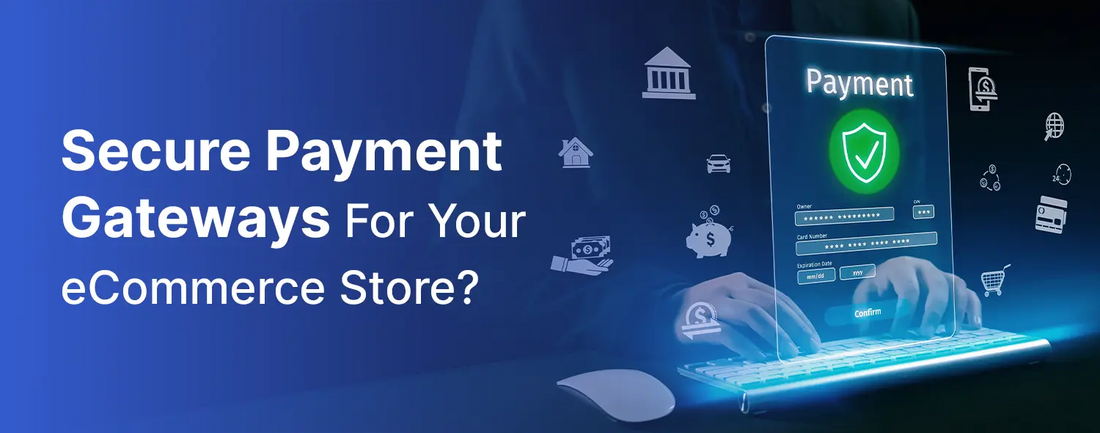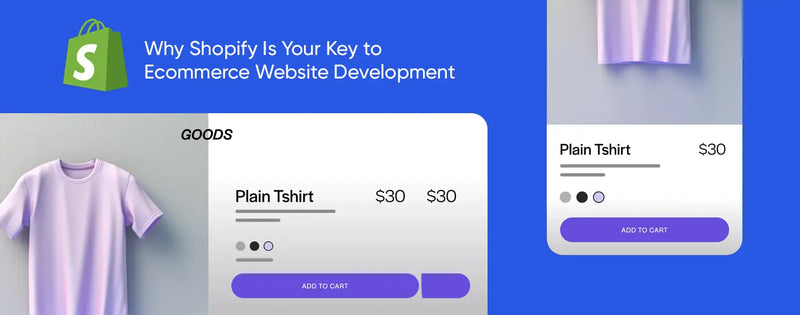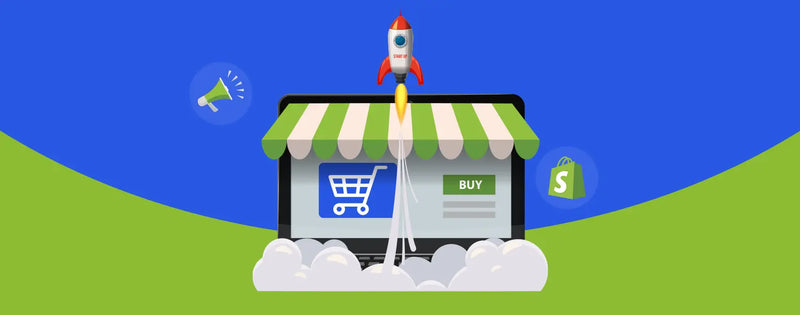Table of Contents
Any Shopify store must have secure payment gateways. They secure and safeguard customer information, decrease fraud and generate trust, which directly impacts the repeat purchase. The most effective gateways are Shopify Payments, Stripe, PayPal, Braintree, and Adyen that share the compliance of PCI DSS, the encryption of data through the use of the SSL/TLS, tokenization, and fraud detection. In the case of global stores, multiple gateways are preferred, which guarantees a high uptime, additional payment methods, and conversions. A secure, smooth checkout is not a luxury; it is something that makes the shoppers come again.
Any online store needs secure payment gateways.
With global eCommerce sales expected to grow over 8 trillion by 2027, consumers are increasingly paying online at a faster pace, and trust and security are no longer negotiable. An efficient, hassle-free checkout is not merely an asset of a technical feature, but a business motivator.
The use of solutions that have strong protection, such as PCI DSS certification and highly-advanced encryption, is essential to all Shopify store owners, as well as to enterprise brands. Research indicates that 18 percent of the U.S. customers abandon shopping carts because of insecurity in payments.
Encrypted payment services (Shop Pay, PayPal, credit cards, etc.) can help merchants minimize abandonment and convert a one-time visitor into a regular customer. This blog will help you find secure payment gateways for your ecommerce store.
The Importance of Security in Payment Gateways

Your reputation and customers are safe with secure payment gateways. The top payment gateways for Shopify need to be encrypted according to the industry standard (SSL/TLS) to protect data on the air. Certificates (written in green as a lock icon and the word ssl) confirm the identity of your site and ensure the impossibility of duplicating it by attackers.
There are also gateways that are in line with PCI DSS standards which is a worldwide security guideline that deals with card information. The online stores that accept credit cards are obliged to comply, and it demonstrates to your customers that you are a responsible person with their information. Shopify Payments, and others, are, for instance, PCI-compliant.
Besides encrypting and complying, secure gateways have fraud prevention features. This involves such approaches as 3 3-D Secure (authentication of the cardholder), CVV, and advanced surveillance. Numerous gateways employ real-time fraud scoring or AI (e.g. Stripe Radar) to add suspicious transactions to the blacklist. 2-Factor Authentication (2FA) and tokenization (the card number is stored in the form of a token) are additional secure measures of customer information.
Choose a gateway that;
- Supports the encryption of data
- Monitor the transactions in real time
- Demands two-factor authentication
Practically, it implies the selection of providers who specifically promote the benefits of PCI DSS compliance, high-quality encryption, and specialization in anti-fraud services.
Key Features of Secure Payment Gateways:
- SSL/TLS Encryption: Ensures all data between browser and gateway is encrypted.
- PCI DSS Compliance: Mandatory standard for handling payment info.
- Fraud Protection: Machine-learning risk analysis and 3-D Secure are used to identify fraud.
- Tokenization/Vaults: Non-sensitive tokens are stored, rather than the entire card information (e.g. Braintree Vault).
- Global Currency & Method Support: Multi-currency payment processing, multi-method support ensures secure local payment options worldwide.
Top Secure Payment Gateways for Shopify Store
Shopify merchants have many secure payment gateways. Below are ten of the best, each supporting Shopify or widely used in eCommerce:
1. Shopify Payments

Shopify Payments is an in-built Shopify gateway, which is integrated into the Shopify platform. It allows merchants to accept credit/debit cards, digital wallet checkout (Apple Pay/Google Pay), and even buy-now-pay-later without integration at all.
Pros:
- Shopify payment gateway that needs no external installation.
- PCI DSS compliant payment gateway that supports end-to-end encryption using SSL.
- Accepts Shop Pay (one-tap checkout that increases the conversion rate by up to 50 percent).
Cons:
- Restricted to those countries which have Shopify Payments.
- Transaction fees if third-party gateways are added alongside.
- Lacks advanced customization compared to Stripe.
Top Use Cases:
- DTC eCommerce brands.
- Retailers making more conversions with Shop Pay.
- Multi-channel Shopify sellers (Tik Tok, Instagram, Youtube, etc.).
- SMBs needing quick setup without external accounts
- Subscription-based Shopify stores
2. Stripe

Stripe is a developer application that is flexible and highly secure. It accepts online and in-store payments, and it can be easily integrated with Shopify (Payments is run by Stripe in most locations).
Pros:
- Supports 135+ currencies & local methods for global reach.
- Contactless fraud detection (Radar with machine learning).
- Transparency, pay as you use pricing (No monthly charges).
Cons:
- Extra costs for international & manually keyed-in cards.
- Requires developer expertise for advanced setups.
-
Chargeback disputes can be complex.
Top Use Cases:
- High-volume Shopify merchants
- SaaS platforms needing recurring billing
- Global marketplaces with multiple payment methods
- Mobile-first businesses with API integrations
- Startups scaling internationally
3. PayPal (PayPal Checkout)

PayPal has become one of the best known brands in online payment. Being a hosted gateway, the customers are capable of paying through the PayPal balance, bank account, and card using the PayPal checkout flow. Its brand recognition instills trust in shoppers who know PayPal’s buyer/seller protection programs. PayPal Checkout is easy to set up on Shopify (no contract or subscription) and works in over 200 markets.
Pros:
- Highly trusted global brand with buyer/seller protection.
- Easy Shopify integration, no setup or monthly fees.
-
Accepts PayPal balance, bank accounts, Venmo (US), and cards.
Cons:
- Higher processing fees than many competitors.
- Redirected off-site checkout can hurt UX.
-
Risk of account holds & disputes freezing funds.
Top Use Cases:
- Stores targeting international buyers.
- Businesses needing instant consumer trust at checkout
- Merchants offering Venmo in the U.S.
- SMBs that want quick setup with no monthly costs
- eCommerce stores with high cart abandonment rates
4. Authorize.Net

Authorize.Net (owned by Visa) is a long-standing gateway built for reliable, multi-option payments. It supports on-site checkout (so customers stay in your store), as well as virtual terminals and automated recurring billing.
Pros:
- Backed by Visa, robust and reliable infrastructure.
- Supports eChecks, recurring billing & digital wallets.
-
Advanced fraud detection tools (AVS, CVV, Kount).
Cons:
- $25 monthly gateway fee + transaction costs.
- Requires merchant bank account setup..
-
More complex setup compared to Stripe/Shopify Payments.
Top Use Cases:
- Established SMBs and enterprises
- Businesses that have recurrent billing through subscription
- Healthcare, financial, or regulated
- U.S. traders who favor Visa-secured infrastructure
- Merchants requiring advanced fraud filters
5. Adyen

Adyen is a global payments platform that is enterprise-grade. It drives payments of large brands (Uber, Spotify, etc.) and is the best fit to Shopify Plus merchants with international sales.
Pros:
- Enterprise quality, driving Uber, Spotify, etc.
- 150 currencies supported, 250 payment methods.
- Dynamic fraud security with real-time risk analytics
Cons:
- Complex integration (developer support needed).
- Pricing requires negotiation, no transparent plans.
-
Overkill for smaller Shopify merchants.
Top Use Cases:
- Shopify Plus payment solutions help merchants selling internationally.
- Enterprises handling multi-currency transactions
- Subscription & on-demand economy businesses
- International companies that require consolidated reporting and analytics
- Firms with in-person as well as hybrid models
6. Braintree
PayPal owns Braintree, which provides full-secured payment with tokenized card storage to use one-clicks to checkout. It is also PCI compliant, supports PayPal, Venmo, Apple Pay, etc. Flexible, fraud-defended, but advanced, perhaps must be integrated into a developer.
Pros:
- Vault tokenization enables one-click repeat purchases.
- No monthly fees, just transaction-based pricing.
- Supports PayPal, Venmo, Apple Pay, Google Pay & cards.
Cons:
- Fee structure varies by method (less transparent).
- Smaller brand recognition vs PayPal alone.
- Some advanced features need developer setup.
Top Use Cases:
- Stores offering multiple wallets (PayPal, Venmo, Apple Pay)
- Subscription-based businesses with stored payment info
- Shopify merchants scaling with flexible integrations
- International sellers needing broad payment method support
- Merchants prioritizing fraud protection + tokenization
7. Square
Square is known for its point of sale hardware though it also provides an online payment gateway. It is a product that serves small and middle-sized retail and services companies. Square assimilates all PCI compliance and charges, thus merchants simply pay a fixed transaction fee (e.g. 2.9%+30 cents online).
Pros:
- Simple to install with no subscription charges.
- Strong fraud monitoring (AI + human review).
- Seamless POS integration for offline +& online selling.
Cons:
- Not supported as a Shopify gateway (manual sync needed).
- Available only in select countries (US, UK, CA, JP, etc.).
- Limited global currency support compared to Stripe/Adyen.
Top Use Cases:
- Small to mid-sized retailers
- Service-based businesses needing POS + mobile payments
- Food, beverage, and local commerce brands
- SMBs with hybrid online + offline sales
- Merchants in Square-supported regions
8. Checkout (Verifone)
 2Checkout, now Verifone, is a global payment gateway popular with small businesses selling worldwide. It supports transactions in 200+ countries and offers various plans for digital and physical goods.
2Checkout, now Verifone, is a global payment gateway popular with small businesses selling worldwide. It supports transactions in 200+ countries and offers various plans for digital and physical goods.
Pros:
- No monthly gateway fee on basic plans.
- Intrinsic fraud screening and PCI compliance.
Cons:
- High per-transactions fee (3.5 percent and 0.35, and inter-country charges).
- Hosted off-site checkout (hurts seamless UX).
- Complex plan variations (pricing varies by usage).
Top Use Cases:
- SMBs selling digital or physical goods globally
- Shopify stores with large international traffic
- Merchants without access to local processors
- Subscription or SaaS businesses testing new markets
- Niche eCommerce shops expanding worldwide
9. Payoneer

Payoneer specializes in secure cross-border payments, trusted by Airbnb and Google. Supporting 150+ currencies, it’s ideal for B2B and freelancers. It’s secure and regulated, but not a direct Shopify checkout option, with fees for card payments.
Pros:
- Trusted by companies like Airbnb & Google.
- Supports 150+ currencies & local payouts.
- Strong for B2B and freelancer payments.
Cons:
- Up to 3% fee for credit card payments.
- Not a direct Shopify checkout option.
- Limited consumer-facing features (more B2B-oriented).
Top Use Cases:
- Cross-border eCommerce businesses
- B2B platforms with international vendors
- Freelancers receiving global payments
- Shopify sellers needing local bank payouts
- Businesses managing multi-currency accounts
10. Worldpay (FIS)
Worldpay is a global enterprise gateway supporting 120+ currencies, cards, wallets, and even cryptocurrency. PCI-compliant with fraud analytics, it scales for high-volume businesses. Costly contracts and complex onboarding make it best for large Shopify-powered enterprises.
Pros:
- Supports 120+ currencies & all major payment methods.
- Enterprise-grade fraud tools & analytics.
- Handles high transaction volumes reliably..
Cons:
- Pricing is quote-based and costly for SMBs.
- Integration best suited for large retailers.
- Complex contracts and onboarding process.
Top Use Cases:
- Large enterprise Shopify merchants
- Global retailers selling in multiple regions
- High-volume eCommerce platforms
- Businesses accepting cryptocurrency or alternative methods
- Brands needing advanced fraud & risk management
Choosing the Right Payment Gateway for Your Shopify Store
 The choice of the appropriate payment gateway is one of the most important choices that Shopify store owners can make. It has a direct influence on the customer trust, speedy checkout, rates of conversion and even your long-term scalability. The wrong decision may result in expensive charges, loss of carts or obstacles to international growth.
The choice of the appropriate payment gateway is one of the most important choices that Shopify store owners can make. It has a direct influence on the customer trust, speedy checkout, rates of conversion and even your long-term scalability. The wrong decision may result in expensive charges, loss of carts or obstacles to international growth.
The following is a checklist of a decision-making checklist to help you select:
1. Transaction Fees
Every gateway charges differently. Most follow a “per-transaction fee” model, often 2.9% + $0.30 for domestic card payments. But there are hidden costs:
- International card charges: There are a few gateways that charge 1-2 percent to international cards.
- Monthly charges: Authorize.Net is one such example, which has a 25/month gateway fee.
- Dispute/chargeback charges: This is a fee usually of between 15 and 25 dollars per dispute.
Important to note: Pricing Pay-as-you-go (e.g. Stripe or PayPal) is a priority in startups; businesses should negotiate custom prices (e.g. Adyen or Worldpay).
2. Currency and Country Support
You should ensure that your gateway can cover multi-currency payments and local payment options in case you sell internationally.
For example:
- Stripe supports 135+ currencies.
- Shopify Payments will only be limited to the regions supported by Shopify.
Hint: It is always best to select a gateway that allows their customers to pay in their own currency. This reduces cart abandonment and increases trust.
3. Fraud Protection Features
Fraudulent transactions not only cost money but damage your brand reputation. Look for features like:
- 3-D Secure authentication (extra password or SMS confirmation).
- Machine-learning fraud scoring (Stripe Radar, Adyen’s risk management).
- CVV and AVS checks for card validation.
- Real-time monitoring to block suspicious activity.
Tip: Cheap gateways without fraud protection may save money upfront but lead to higher chargeback losses.
4. Integration with Shopify
Whichever gateway you use should be able to blend well with the Shopify checkout. The solutions that are not well integrated create friction and demoralize buyers.
- Shopify Payments is completely native (no third party arrangement).
- Stripes and PayPal can be easily integrated with just a few clicks.
- Authorize.Net can use third-party apps which are complex.
Hint: It is recommended to test the checkout flow at all times. Insignificant delays such as redirects or additional logins have the power to decrease conversions.
5. Scalability: Startup vs. Enterprise.
The right gateway will rely on the stage of growth.
- Startups/SMBs: Require plug and play, cheap solutions (Shopify Payments, Stripe, PayPal).
- Enterprises: Advanced fraud prevention, multi currency, negotiated fees, are required (Adyen, Worldpay).
Tip: Plan for the future. Select a gateway that will grow with you, and therefore avoid changing when your traffic goes mainstream.
Secure Payment Gateways Future Trends (2025 and Beyond).
The payment gateway is rapidly evolving as per the requirements of the consumers, the cyber threats, and the new technologies. The following five trends are going to influence the future of secure payments in 2025 and further:
- Artificial Intelligence Fraud Detection: Smart AI will stop fraud automatically without interrupting serious buyers.
- Biometric Authentication: Fingerprints, face, and voice IDs will substitute passwords to have a quicker and safer checkout process.
- Tokenization & Blockchain Payments: Tokens and blockchain will provide transaction security and implement borderless and tamper-proof payments.
- Buy Now, Pay Later (BNPL): BNPL development solutions turn secure installment payments into flexibility to the customer factor of trust.
- Cross-Border Payment Innovations: The Global payments with multi-currency, local and blockchain will be implemented to be safer and cheaper.
Errors to Prohibit While Selecting Secure Payment Gateways
There are numerous Shopify merchants who commit preventable mistakes in their choice of payment gateway. Here are the top mistakes and how to sidestep them:
1. Choosing the Cheapest Option Without Fraud Checks
Low-cost gateways often skip advanced fraud detection. This saves money upfront but leads to chargebacks, losses, and account suspensions.
Fix: Always verify the fraud prevention tools included—AI fraud scoring, CVV checks, and 3-D Secure should be non-negotiable.
2. Ignoring PCI DSS Compliance
The worldwide standard of payment security is PCI DSS. Failure to do so may attract a hefty fine, increased fee or even card processing privilege.
Fix: Select only the gateways that promote full compliance with PCI DSS (Shopify Payments, Stripe, PayPal, etc.).
3. Unchecking Checkout Speed Checkout UX
A sluggish or cumbersome check out makes customers off regardless of how secure a gateway has been. Cart abandonment can rise by up to 27 per cent. with redirects (such as PayPal) or unnecessary processes.
Fix: Checkout processes on mobile and desktop. Make it fast, one-click where possible, and use SSL.
4. Unavailable Multi-Currency Support
Most of the merchants stretch world wide only to discover that their gateway does not accommodate particular currencies or domestically practiced methods. This is compelling customers to do away with carts.
Fix: In case you want to sell abroad, you should select a gateway such as Stripe, Adyen, or Worldpay which accepts various currencies and local payment options.
5. Overlooking Scalability Needs
What works for a small store may fail at enterprise scale. For example, PayPal is great for startups but lacks the advanced risk management of Adyen.
Fix: Think long-term. Select a gateway, which will support your traffic, revenue and international expansion objectives.
Advantages of Multiple Payment Gateways
 Enterprise Shopify stores often use multiple gateways rather than a single one. This strategy improves customer choice and uptime. For example, some customers prefer PayPal, others credit cards or Buy-Now-Pay-Later. Offering 3–4 payment options on checkout is common. Studies find about 3–4 gateways on average are used per site.
Enterprise Shopify stores often use multiple gateways rather than a single one. This strategy improves customer choice and uptime. For example, some customers prefer PayPal, others credit cards or Buy-Now-Pay-Later. Offering 3–4 payment options on checkout is common. Studies find about 3–4 gateways on average are used per site.
The benefits of multiple gateways include:
- Better customer coverage (different regions or card brands)
- Redundancy (if one provider has downtime, others can handle sales)
- Higher trust (seeing several well-known logos boosts confidence).
To manage this, Shopify owners should ensure each added gateway is PCI compliant and integrates smoothly. Shopify’s admin lets you enable many gateways simultaneously, so you can accept Visa/Mastercard through one gateway, digital wallets through another, and PayPal or local methods through a third.
Conclusion
The choice of secure payment gateways is essential to the residents of Shopify stores. Some of its major requirements are a strong security level (encryption, compliance with PCI DSS, fraud protection) and an integration with the platform of Shopify. The above gateways are among the best options in various requirements: Shopify Payments and Stripe are native to Shopify and small businesses, Adyen and Worldpay are offered to large volume international merchants. It’s often wise to offer multiple methods (credit cards, wallets, BNPL) via more than one gateway to maximize customer convenience and uptime.
Build Trust with the Right Payment Gateway!
At ShopX Commerce, we assist Shopify brands to have secure, high-performing checkout systems that reduce risks and maximize conversions. Our team builds you a store that will scale without disaster by integrating the correct payment gateways and offering protection against fraud and PCI compliance.
Prepared to make the most secure checkout using payment gateways?
Connect with us and make your Shopify store faster, safer, and more profitable.








